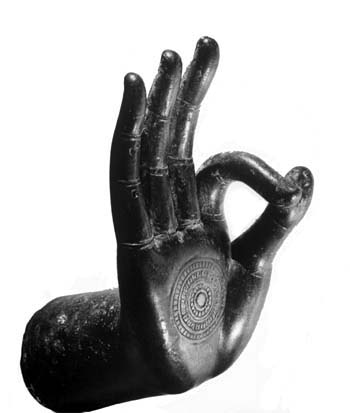Mar 02, 2026
Mar 02, 2026
by Ch'onsa Kim
 Buddhism does not aim to explain God, creation or eternal concepts. Such truths can only be found within the heart of a person.
Buddhism does not aim to explain God, creation or eternal concepts. Such truths can only be found within the heart of a person.
Whatever one holds within the heart is what is.
What Buddhism does aim to do is help us overcome the chaos of this world and point us to a path that leads us to our own spirituality.
We are all searching for the same things - freedom from our pain and realizing who we truly are, deep within.
The Buddha, Siddharth Gautama, in his contemplation, realized the truth about suffering and the path to liberation from it. This Eight-Fold Path and Four Noble Truths make up the foundation of Buddhism.
Right View : The Four Noble Truths
When we are able to recognize suffering as it enters our lives, see that our own desires have brought us this pain, and understand that letting go of this desire can bring us peace we have attained Right View.
Right Thought
Reality grows in the garden of the mind. Our world is the fruit of our thoughts that sprout from the seeds of ideas. We must therefore be discerning gardeners, looking carefully at what ideas we allow to take root within the mind. We must be able to recognize which ideas and thoughts are born of desire and which carry the seeds of desire that causes our suffering.
The seeds of suffering that take root within the mind are those of greed, ill-will, hostility, denigration, dominance, envy, jealousy, hypocrisy, fraud, obstinacy, presumption, conceit, arrogance, vanity and negligence. In Buddhism, these are known as the 15 defilements, and the Buddha realized 6 methods for removing such defilements from the mind:
Right Speech
We are often judged by our words. Long after we leave this world, our words shall remain. Words can often be sharper than the blade of the sword, bringing harm to the spirit of a person which can cause wounds that are deeper and last longer than that of a dagger. Therefore, we must choose our words carefully. The Buddha realized 4 methods of speech that bring peace to our lives and the lives of those who surround us.
Right Action
All of our lives we have been instructed to do the right thing. Often we are perplexed with what is the right thing. Ultimately, we must decide for ourselves what is right- but often our judgment is clouded by the defilements of the mind. While upon the Eight-Fold path, we must remember that our aim is to end our suffering. All we do, comes back to us in one way or another, eventually. What may be the right thing for the moment may not be the right thing for the next. Although this moment is the only one that exists, we must not fail to realize that within this moment- the past, present and future are contained. The truly right does not change from moment to moment. Look deep within your own heart, and you will know what is right.
The Golden Rule in Buddhism is: Do No Harm.
The Buddha practiced the following code of conduct in his own life:
Right Livelihood
Often when one begins practicing the ways of Peace, a time comes when lifestyle must be evaluated. In this life, we have the opportunity to liberate ourselves from the cycle of suffering and find peace. We also have the opportunity to help others break free. Does one's way of life support or hinder the ways of Peace? Only the heart knows.
Right Effort
The path is not an easy one. Our habits of suffering are strong, and deeply imprinted in our way of life. It is difficult to maneuver peacefully in a world of chaos. Many of the things that we know we must let go of are things that we have held dearly for we have fought fiercely to obtain them. Our very own self- identity may have been formed with great personal sacrifice. Discipline and diligence is key to persevering on the path. Therefore, our decision to take up the path to liberation must be firm, and executed with right effort. When we have realized the truth of suffering, and are willing to seek liberation with the same tenacity as a drowning man struggles for a breath, then right effort has been attained.
Right Mindfulness
Being mindful of the heart of matters can help us to overcome suffering with understanding. When sitting, laying or moving, being mindful of the following four frames of references are said by the Buddha to help us achieve great understanding, and can even help us unlock the secrets that are within our hearts.
Right Concentration
As we sail through life, the winds of desire push us toward the Ocean of Suffering. But the skillful stand firm in virtue at the helm, directing the rudder of the mind toward peace. Single-minded concentration on the path to Peace (the Eight-Fold path) is right concentration. It is picking yourself up when you stumble and continuing onward. It is recognizing why you have fallen astray. It is recognizing when you are about to fall. It is continuing upon the path without hesitation or doubt. It is never ceasing to develop our skill in the way.
Namaste'
References:
The Mulalapariyaya, Sabbasava, Sammaditthi, Satipatthana, Vitakkasanthana, Abhaya, Mahacattarisaka, and the Bhaddekaratta Suttas of the Majjhima Nikaya (the Middle Length Discourses of the Buddha)
01-Nov-1999
More by : Ch'onsa Kim

|
Thank you Ch'onsa Kim. This has been a timely reminder to me of my own failure to follow the Eight-Fold Path and has caused me to renew my efforts, |